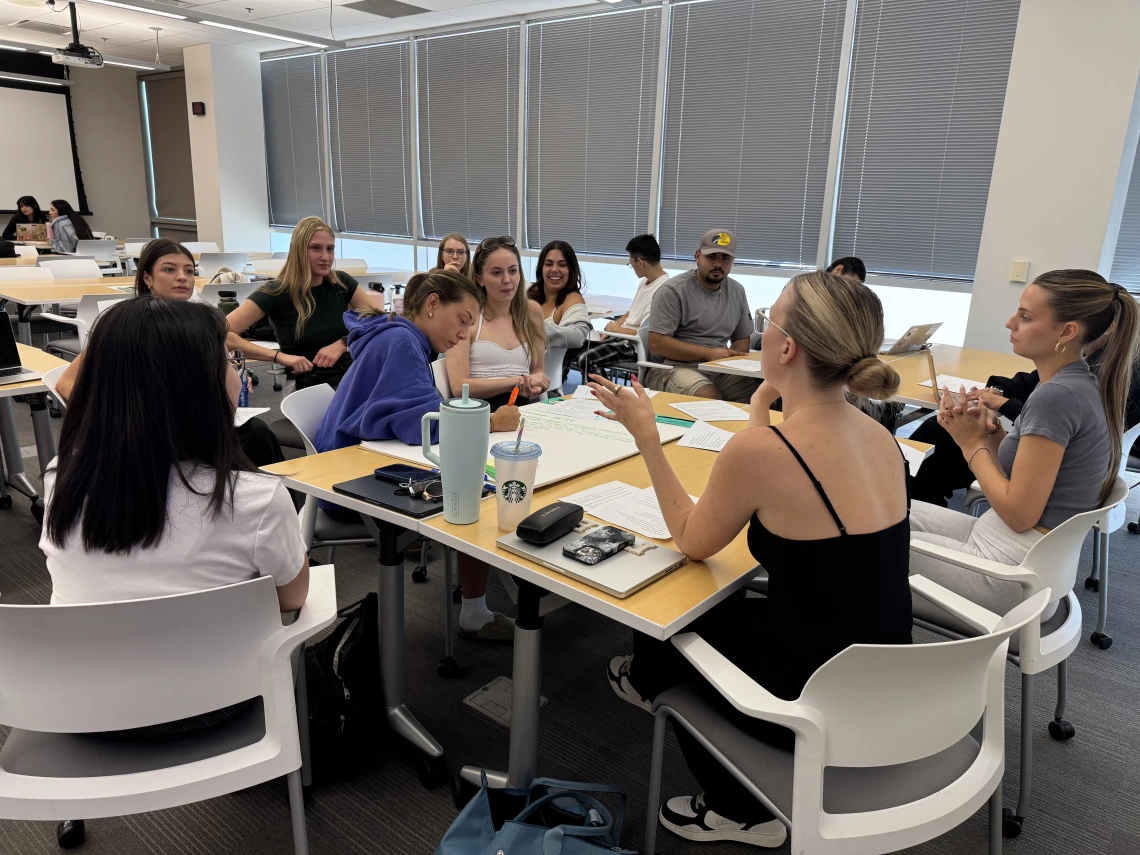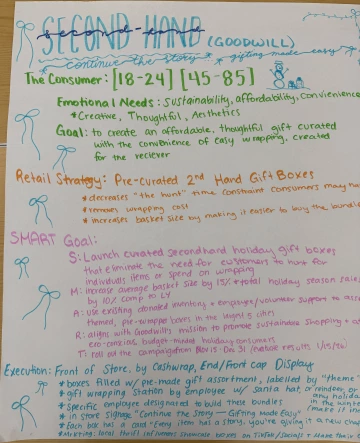Norton students design retail strategies that put meaning over money this holiday season

Retailing and Consumer Science students collaborate during the "Meaning Over Money" workshop, developing creative and sustainable holiday retail strategies.
Image courtesy of the University of Arizona Retailing and Consumer Science program
This holiday season, students in the Retailing and Consumer Science program are crafting real-world retail strategies to show that creativity – not cost – defines value. Their Meaning Over Money project turns classroom learning into retail strategies that blend empathy, sustainability and measurable business results.
“Our students learned how consumers find meaning when resources are limited,” said Soo Hyun Kim, an associate professor of practice at the Norton School of Human Ecology, who guided the project. “Constraint doesn’t limit creativity – it ignites it. Their strategies can help retailers transform that insight into innovation.”
The project extends collaborative research on Constraint-Driven Creativity, a framework showing how financial limitation can inspire innovation, sustainability and moral value in consumption.
Reaching a generation of young consumers
"Our work focused specifically on Gen Z consumers," Kim said. "Students began with reflective writing and small-group discussions about how they navigate gift giving and shopping when budgets are limited. We analyzed 32 reflections to identify consistent psychological themes."
Over the course of a semester, project participants developed three actionable strategies that reflect real Gen Z values, including authenticity, sustainability and emotional connection.
“We realized that people don’t stop giving [gifts] when money is tight,” said Peyton Balch, a student who worked on the project. ”They give differently. Sustainability and affordability can bring even more joy.”
Student-designed strategies

Students brainstorm the “Pre-Loved, Re-Loved,” “Made by You, Wrapped by Us,” and “Create Together” strategies.
Image courtesy of the University of Arizona Retailing and Consumer Science program
Students devised strategies to benefit a variety of retailers during the 2025 holiday shopping season.
Their research showed that while holiday shoppers do value the sustainability and uniqueness of secondhand goods, most lack the time to hunt through thrift shop racks for the right gift. The solution: “Pre-Loved, Re-Loved Gift Boxes,” curated, pre-wrapped gift boxes containing secondhand goods, along with story cards explaining the items’ history.
“Every item already has a story,” explained project participant Isabella Morris. “We’re helping shoppers give it a new chapter.”
Meaning Over Money participants also noted that Gen Z and young professionals want to give heartfelt, personalized gifts at an affordable price point, and without long wait times. Their second strategy, “Made by You, Wrapped by Us,” suggests that local boutiques and small stores create an in-store gift box station where shoppers choose from a selection of inexpensive items to build a custom gift box at a set price. Items could be monogrammed for a small up-charge, and each box would be professionally wrapped by store staff.
“As students, we wanted gifts that feel personal without overspending,” said project participant Alex Gouws. “These ideas make creativity accessible to everyone.”
Creativity is at the center of the students’ third holiday retail strategy: “Create Together Workshops.” They suggest that larger retailers could turn some of their locations into hubs where families and communities could come together and build memories while they learn to create DIY crafts like home décor, handmade art or jewelry, or season-specific children's crafts.
A fresh approach to holiday shopping
According to Kim, the Meaning Over Money project serves as a demonstration of how empathy and data-driven strategy can coexist in retail education. It also showcases the Norton School’s commitment to experiential learning and to preparing students to lead in a value-driven retail economy.
"The project demonstrates how future retail professionals translate Gen Z perspectives into thoughtful and actionable strategy," he said.
He noted that several students involved with the project are exploring ways to adapt their ideas for local businesses.
“Together, these ideas function as creative prototypes that illustrate how young consumers conceptualize meaningful and sustainable holiday experiences,” he said. "They deliver both emotional and financial value in line with evolving retail trends."
